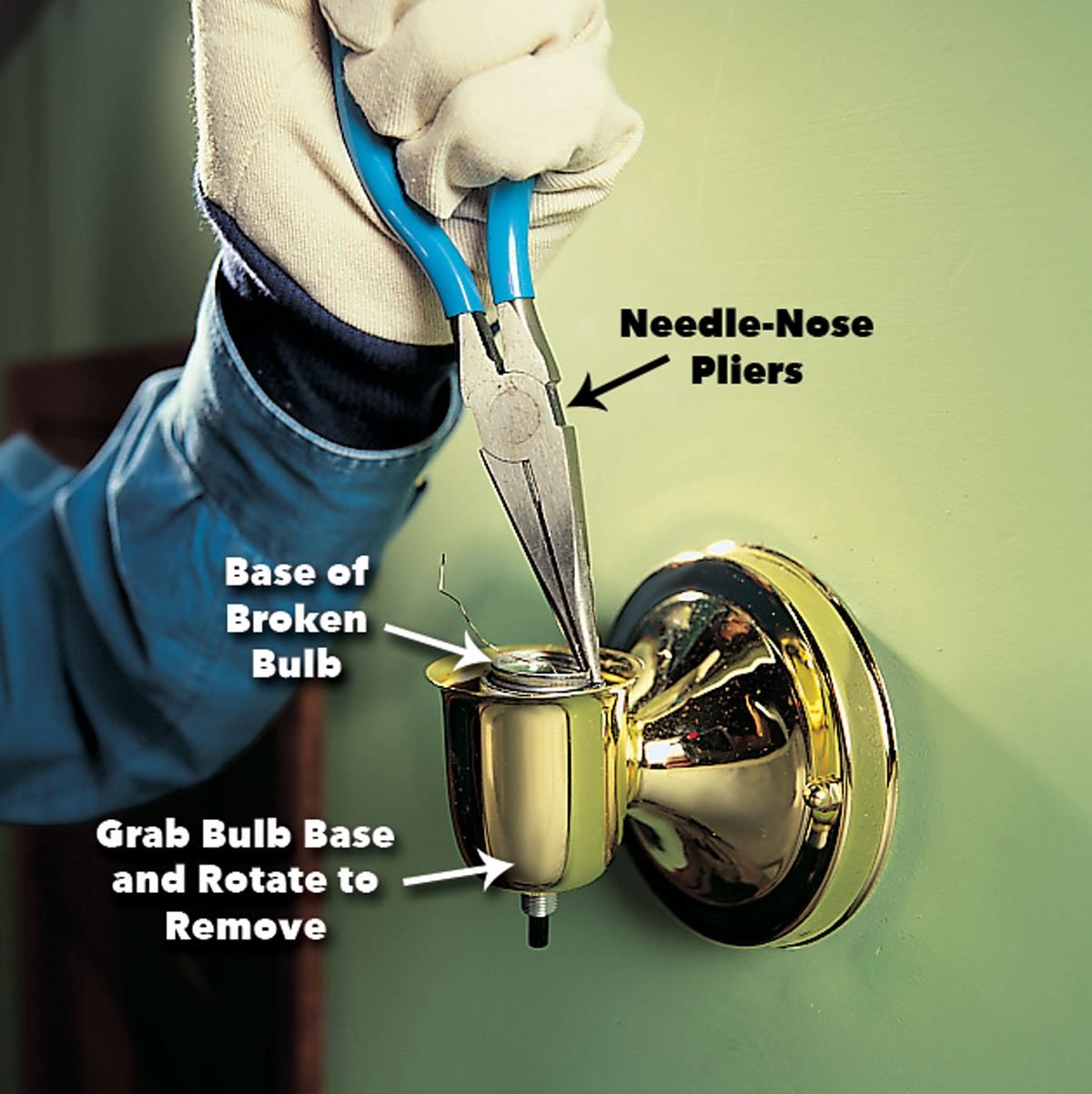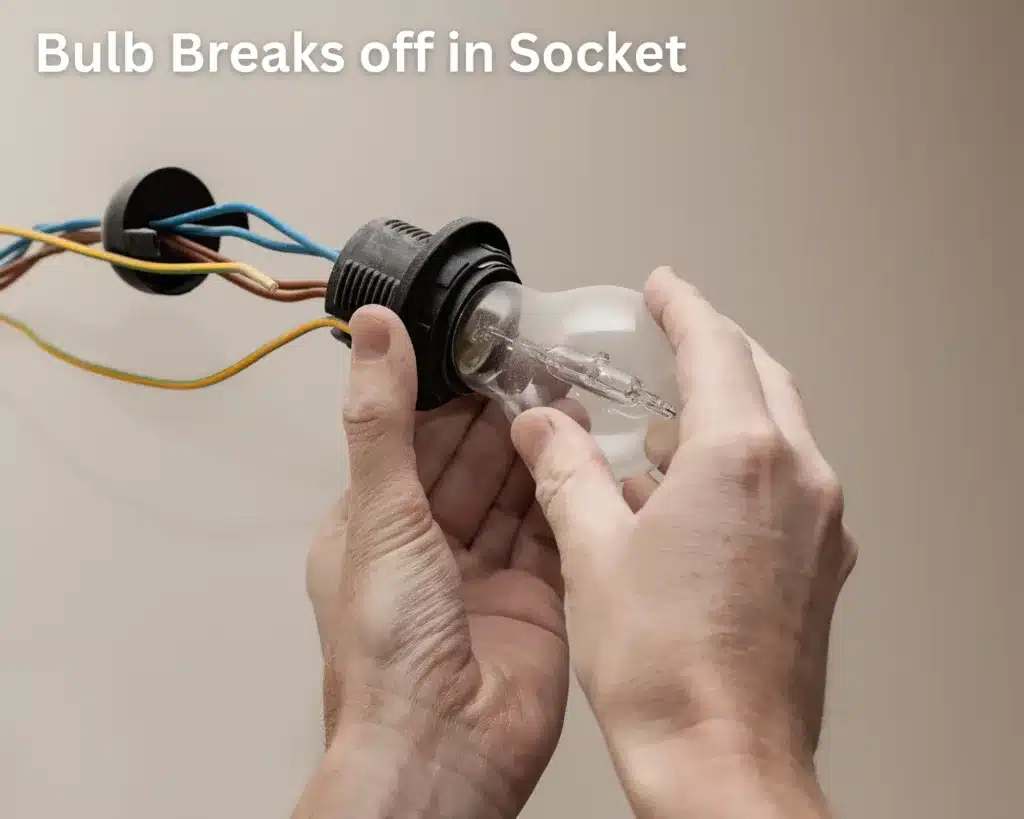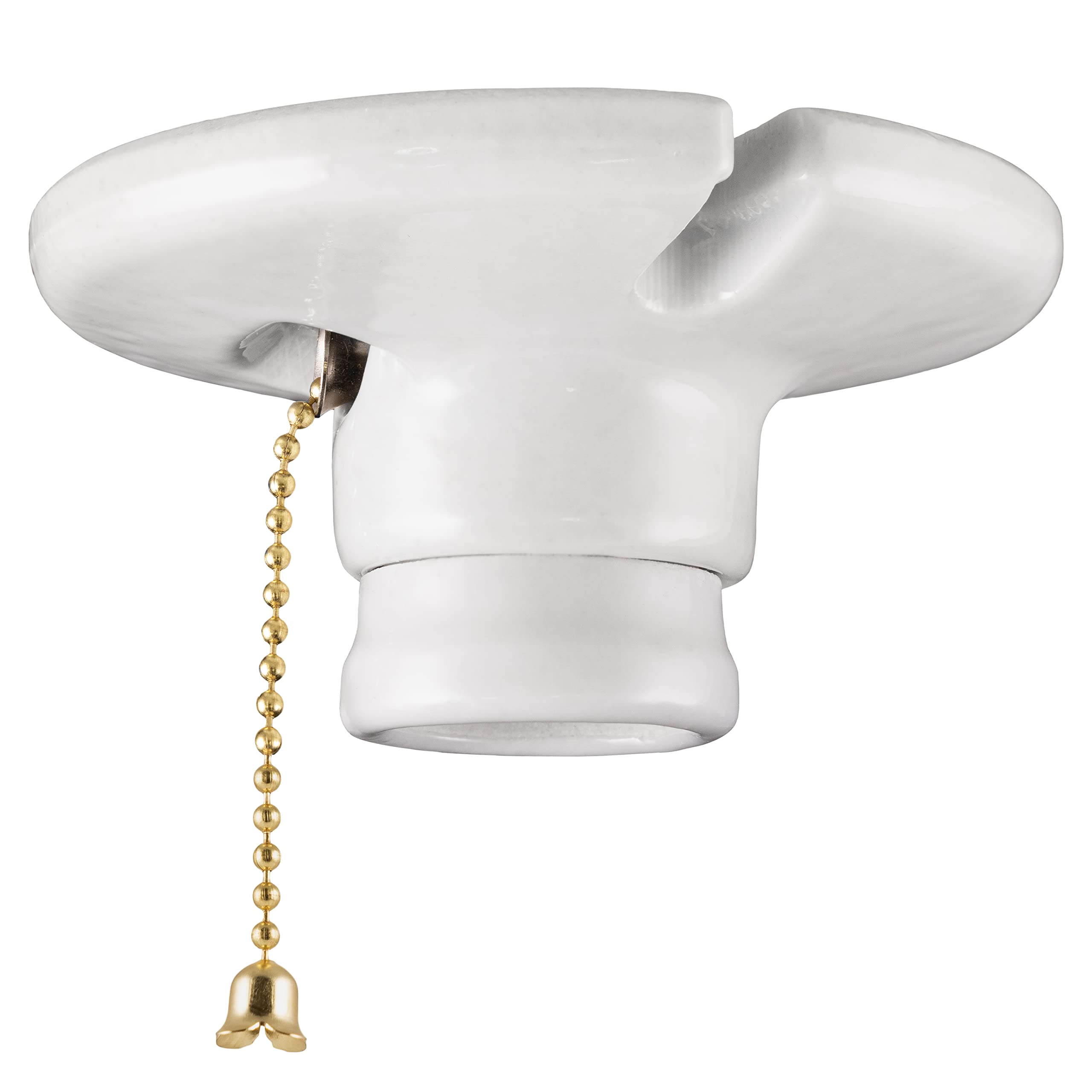What to Do When Light Bulb Breaks off in Socket, To remove a broken light bulb, first turn off the power. Then use pliers to twist out the remaining base carefully.
A broken light bulb in a socket can be frustrating and hazardous. Ensuring safety is paramount before attempting removal. Start by turning off the power at the circuit breaker to avoid electric shock. Use needle-nose pliers or a potato to grip and twist out the bulb base.
Wear protective gloves and goggles to prevent injuries from glass shards. If the bulb base is stuck, apply gentle pressure and patience. After removal, inspect the socket for any remaining debris and clean it thoroughly. By following these steps, you can safely and efficiently handle a broken light bulb in a socket.
Safety First
Dealing with a broken light bulb can be tricky. Safety is your top priority. Always follow these steps to prevent injury and stay safe.
Cut The Power
Before doing anything, turn off the power. Locate the circuit breaker and switch off the relevant circuit.
You can also unplug the lamp or fixture. This step ensures no electricity flows to the socket, making it safer to work.
Wear Protective Gear
Broken glass can cause cuts and injuries. Wear protective gloves to shield your hands. Use safety goggles to protect your eyes from any glass shards.
Consider wearing long sleeves and pants. This extra layer of protection can help prevent injuries.
Tools You’ll Need
When a light bulb breaks off in the socket, having the right tools is crucial. Using the right tools ensures safety and efficiency. Here are the basic and advanced tools you’ll need.
Basic Tools
- Needle-nose pliers: Helps to grip and remove broken bulb pieces.
- Gloves: Protect your hands from sharp glass shards.
- Safety goggles: Shields your eyes from any flying debris.
- Flashlight: Provides better visibility in low-light areas.
- Cardboard or thick paper: Used to safely dispose of glass fragments.
Advanced Tools
- Voltage tester: Ensures the socket is not live before you start.
- Rubber jar opener: Offers a better grip on the broken bulb base.
- Potato: A creative tool to remove the broken bulb base.
- Bulb extractor tool: Specially designed for removing broken bulbs.
- Vacuum cleaner: Cleans up any remaining glass fragments.
Removing The Broken Bulb
A broken bulb stuck in a socket can be a hassle. Safety is the first step. Always ensure the power is off. Using the right tools can make this task easier. Here, we cover two effective methods.
Using Pliers
Pliers are a handy tool for this task. They offer a firm grip. Below are the steps to follow:
- Turn off the power at the main breaker.
- Wear safety gloves and safety glasses.
- Use needle-nose pliers to grip the metal base.
- Twist counterclockwise to loosen the base.
- Dispose of the broken bulb safely.
Using A Potato
A potato can also help remove a broken bulb. This method is simple and effective. Follow these steps:
- Turn off the power at the main breaker.
- Cut a raw potato in half.
- Press the cut side onto the broken bulb’s base.
- Twist counterclockwise to unscrew the base.
- Dispose of the broken bulb safely.
Tip: Always handle broken bulbs with care to avoid injuries.
Using A Bulb Extractor
A broken light bulb can be a hassle. Using a bulb extractor makes the job safe and easy. This tool is designed to grip and twist out broken bulbs from their sockets.
How It Works
A bulb extractor typically features rubberized tips. These tips grip the broken bulb’s base securely.
To use, insert the extractor into the socket. Twist it counterclockwise to remove the broken bulb.
Always ensure the power is off before starting. This prevents electrical hazards.
Where To Buy
You can find bulb extractors at most hardware stores. They are also available online on platforms like Amazon and eBay.
Prices range from $5 to $20 depending on the brand and features.
Here is a simple table showing some popular options:
| Brand | Price | Available At |
|---|---|---|
| GE | $10 | Amazon |
| Philips | $15 | Home Depot |
| Feit Electric | $12 | eBay |
Alternative Methods
When a light bulb breaks off in its socket, it can be tricky to remove. There are several alternative methods you can use to safely remove the broken bulb. Below, we will explore two effective techniques to help you out.
Duct Tape Trick
Using duct tape is a simple and effective solution. Follow these steps:
- Cut a long strip of duct tape.
- Fold it in half, sticky side out.
- Form a loop with the tape, keeping the sticky side out.
- Press the loop inside the broken bulb base.
- Twist gently to unscrew the bulb.
Needle-nose Pliers
Needle-nose pliers provide a firm grip on the broken bulb base. Here’s how to use them:
- Ensure the power is off.
- Wear protective gloves and eyewear.
- Insert the needle-nose pliers into the bulb base.
- Grip the edges firmly with the pliers.
- Twist counterclockwise to remove the bulb base.
Both methods are safe and effective for removing broken light bulbs. Always prioritize safety by wearing protective gear and ensuring the power is off.

Credit: www.instructables.com
Checking For Damage
When a light bulb breaks off in its socket, it’s essential to check for damage. This step ensures your safety and the proper functioning of your light fixture. Below, we will discuss how to inspect the socket and look for wiring issues.
Inspect The Socket
First, ensure the power is off. Use a flashlight to see inside the socket. Look for any glass fragments or debris. Use pliers or a vacuum to remove them.
| Steps | Description |
|---|---|
| Step 1 | Turn off the power |
| Step 2 | Use a flashlight to inspect |
| Step 3 | Remove debris with pliers or vacuum |
Look For Wiring Issues
Check the wires for damage. Frayed or broken wires can be hazardous. If you see damaged wires, consult a professional. Do not attempt to fix wiring issues on your own.
- Examine the wires closely
- Identify any frayed or broken wires
- Contact a professional if necessary
Cleaning Up
When a light bulb breaks off in the socket, cleaning up is crucial. You must handle the broken glass and debris carefully. This ensures a safe and tidy environment.
Disposing Glass Safely
First, gather the large pieces of broken glass. Use a pair of thick gloves to avoid cuts. Place the glass into a sturdy container or a sealed plastic bag. Label the container as broken glass.
Next, use a piece of sticky tape to pick up smaller shards. Dispose of the tape in the same container. This helps to keep your hands safe and clean.
If the bulb contains mercury, extra steps are needed. Open windows to ventilate the room. Follow local guidelines for hazardous waste disposal.
Vacuuming The Area
Once the glass is cleared, vacuum the area. Use a vacuum with a hose attachment. This reaches into corners and tight spaces.
Make sure to vacuum slowly. This ensures all tiny glass pieces are collected. Dispose of the vacuum bag or clean the canister immediately.
For extra safety, check the floor with a flashlight. It helps to spot any missed shards.
Replacing The Bulb
When a light bulb breaks off in the socket, replacing it can seem daunting. Follow these steps to safely and effectively replace the bulb.
Choosing The Right Bulb
Before replacing the bulb, ensure you select the correct type.
- Wattage: Check the fixture for maximum wattage.
- Type: Verify if it needs an LED, CFL, or incandescent bulb.
- Base: Ensure the new bulb has the same base size.
Choosing the right bulb prevents electrical issues and extends the fixture’s life.
Proper Installation
Install the new bulb correctly to avoid future problems.
- Turn off the power to the fixture at the circuit breaker.
- Use a flashlight to see inside the socket if needed.
- Insert the new bulb gently into the socket.
- Turn the bulb clockwise until it is snug.
Ensure the bulb is secure but not too tight to avoid damage.
| Step | Action |
|---|---|
| 1 | Turn off the power |
| 2 | Use a flashlight to see |
| 3 | Insert the bulb gently |
| 4 | Turn clockwise until snug |
Following these steps ensures a safe and effective bulb replacement.
Preventing Future Breakages
Light bulbs breaking in the socket can be frustrating. Avoid this issue by taking a few precautions. Here are some tips to help you prevent future breakages.
Handling Bulbs Carefully
Always handle bulbs with care. Hold the bulb by the base, not the glass. This reduces pressure on the glass and prevents it from breaking.
- Turn off the power before changing the bulbs.
- Use a clean, dry cloth to grip the bulb.
- Avoid over-tightening the bulb in the socket.
Using Quality Bulbs
Invest in quality bulbs. They are less prone to breaking and last longer.
| Type of Bulb | Durability | Recommended Use |
|---|---|---|
| LED | High | Home and office |
| Halogen | Moderate | Outdoor and spotlight |
| Incandescent | Low | Occasional use |
Choose bulbs from reliable brands. They usually pass rigorous quality tests. Always check the wattage and socket compatibility.

Credit: www.familyhandyman.com
When To Call A Professional
Sometimes, fixing a broken light bulb in the socket isn’t straightforward. You may face issues that require more than just common tools and a steady hand. In such situations, it’s wise to call a professional electrician. They have the skills and tools to handle complex electrical problems safely and efficiently.
Identifying Complex Issues
Complex issues often arise when the broken bulb leaves sharp glass shards behind. These shards can pose a risk of cuts and injuries. Also, dealing with electrical components can be dangerous, especially if the socket is damaged.
Signs of complex issues include:
- Visible damage to the socket
- Burn marks around the socket
- Sparks or unusual sounds when attempting to remove the bulb
- The light fixture not working even after replacing the bulb
Finding A Reliable Electrician
Choosing the right electrician ensures the job gets done safely. Here are steps to find a reliable professional:
- Check Reviews: Look for electricians with good reviews online.
- Verify Credentials: Ensure they have valid licenses and insurance.
- Ask for Quotes: Get multiple quotes to compare prices.
- Get Recommendations: Ask friends or family for trusted recommendations.
A reliable electrician will not only solve the issue but also provide tips to prevent future problems. Always prioritize safety when dealing with electrical issues.
Common Mistakes
Breaking a light bulb in the socket can be frustrating. Many make common mistakes trying to fix it. These mistakes can lead to injuries or damage. Let’s look at some of the most frequent errors.
Avoiding Electrical Shock
Always turn off the power before touching the bulb. Forgetting this step is dangerous. You might get a shock, which can hurt you. Use a voltage tester to check if the power is off.
Do not use metal tools. Metal conducts electricity. A metal tool can shock you if the power is on. Use insulated tools or gloves.
Not Checking For Damage
Inspect the socket for damage. A broken bulb can harm the socket. Check if there are any burns or breaks.
Replace damaged sockets right away. A damaged socket can cause fires or other problems. Better safe than sorry.
Diy Vs Professional Help
When a light bulb breaks off in the socket, you need to decide between DIY methods or calling a professional. Both options have their pros and cons. Let’s explore these in detail.
Cost Comparison
DIY methods are generally cheaper. You mostly need tools you already have, such as pliers or potatoes. These can easily remove the broken bulb.
On the other hand, hiring a professional will cost more. Let’s look at a simple comparison:
| Option | Cost |
|---|---|
| DIY | $0 – $5 |
| Professional Help | $50 – $100 |
Safety Concerns
Safety is another critical factor. When you do it yourself, there’s a risk of electric shock or injury from broken glass. Always ensure the power is off before starting.
Professionals have experience and proper tools. They can handle the task safely. If you’re unsure about your abilities, it’s best to get professional help.
Convenience
Fixing the problem yourself can be quick if you know what you’re doing. Professionals might require scheduling and waiting for them to arrive, which can be inconvenient.
Consider your comfort level with the task. If you’re not confident, professional help can provide peace of mind.
Emergency Preparedness
When a light bulb breaks off in the socket, it can be dangerous. Being prepared for such emergencies can save you from injury. Here are some tips to ensure you are ready for such situations.
First Aid Kit
A well-stocked first aid kit is crucial. Here is what you should have:
- Band-aids of different sizes
- Antiseptic wipes
- Sterile gauze pads
- Adhesive tape
- Scissors
- Tweezers
- Burn ointment
- Gloves
Make sure your first aid kit is easily accessible.
Emergency Contacts
Keep a list of emergency contacts handy. This list should include:
| Contact | Phone Number |
|---|---|
| Local Emergency Services | 911 |
| Family Doctor | 123-456-7890 |
| Nearest Hospital | 098-765-4321 |
| Electrician | 234-567-8901 |
Print this list and keep it near your phone.

Credit: m.youtube.com
Faqs
Breaking a light bulb in its socket can be frustrating and dangerous. Here, we answer some frequently asked questions to help you safely and effectively deal with this issue.
Common Questions
- What tools do I need?
- Can I remove the bulb without tools?
- Is it safe to use my hands?
- What if the socket is damaged?
- How do I prevent future issues?
Expert Answers
| Question | Answer |
|---|---|
| What tools do I need? | You need pliers, gloves, and eye protection. Use a potato or carrot. |
| Can I remove the bulb without tools? | Yes, use a potato or carrot. Push it into the broken bulb. |
| Is it safe to use my hands? | No, always wear gloves. Protect your hands from glass shards. |
| What if the socket is damaged? | Call an electrician. Do not attempt to fix it yourself. |
| How do I prevent future issues? | Use quality bulbs. Avoid over-tightening them in the socket. |
For more detailed instructions, visit our How-To Guides section.
Final Tips
Dealing with a light bulb that breaks off in the socket can be frustrating and dangerous. To avoid future issues and keep your lighting safe, follow these final tips. Regular maintenance and storing spare bulbs correctly can make a big difference.
Regular Maintenance
Keep your light fixtures clean and dust-free. This helps bulbs last longer and reduces the risk of breaking. Check your bulbs regularly for signs of wear or damage.
Always use the right wattage for your fixtures. Overloading can cause bulbs to break. Make sure bulbs are tightly but gently screwed in. A loose bulb can cause flickering and breakage.
Replace old or flickering bulbs immediately. This prevents accidents and ensures a well-lit home.
Storing Spare Bulbs
Store spare bulbs in a cool, dry place. Avoid exposing them to extreme temperatures or moisture. Use original packaging to protect bulbs from damage.
Organize your spare bulbs by type and wattage. This makes it easy to find the right bulb when you need it. Consider using a labeled storage box or drawer.
Handle bulbs with care when storing and installing. Avoid touching the glass with bare hands. Oil from your fingers can reduce bulb life and cause hot spots.
Frequently Asked Questions
How Do You Get A Broken Light Bulb Out Of A Socket?
Turn off the power. Wear gloves for safety. Use pliers to grip and twist the bulb base. Alternatively, use a potato to remove it. Dispose of broken pieces carefully.
Is It Safe To Leave A Broken Light Bulb In The Socket?
No, leaving a broken light bulb in the socket is unsafe. It can cause electric shocks or fires. Always replace broken bulbs promptly.
Why Did My Light Bulb Break In The Socket?
Your light bulb might break in the socket due to overheating, poor quality, improper installation, or age. Always use the correct wattage and handle with care.
What To Do If You Break A Light Bulb?
Turn off the power immediately. Wear gloves to avoid cuts. Use a broom and dustpan to collect shards. Wipe the area with a damp cloth. Dispose of the broken bulb in a sealed bag.
How Do I Safely Remove A Broken Bulb?
Turn off the power, wear gloves, and use pliers to gently twist out the base.
Can I Use A Potato To Remove The Bulb?
Yes, cut a potato in half, press it onto the broken bulb, and twist gently.
What Tools Do I Need?
Use pliers, gloves, and possibly a potato. Always ensure the power is off first.
Is It Dangerous To Remove Broken Bulbs?
Yes, it can be. Always turn off power and wear gloves to avoid injury.
What Should I Do First?
Turn off the power at the circuit breaker to ensure safety.
How Can I Prevent This From Happening Again?
Use quality bulbs and avoid over-tightening to reduce the risk of breakage.
Conclusion
Dealing with a broken light bulb in a socket can be tricky but manageable. Remember to stay safe and follow the steps. With the right tools and precautions, you can resolve the issue efficiently. Regular maintenance can also prevent future problems.
Stay proactive, and your home will stay bright and safe.



